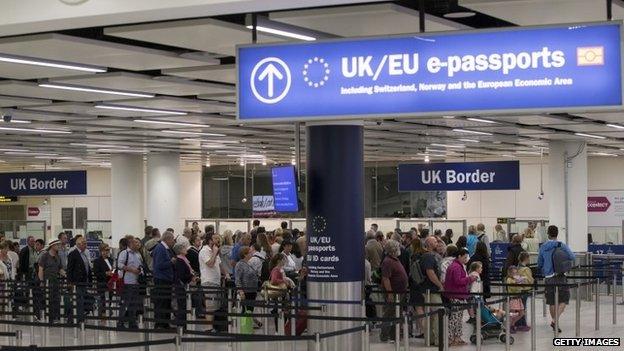EU immigration - the Croatian solution?
- Published

The prime minister will announce plans to limit EU migration before Christmas but the search is still on for a way to do this without needing to re-write the founding treaty of the EU - the Treaty of Rome - which enshrines the principle of the freedom of movement of people.
Sources stress that no final decisions have yet been made on what the specific measures will be, how they will be announced (ie whether in a speech or an article or an interview) or when they'll be made (ie before or after the Rochester by-election).
Yesterday's Sunday Times story about a possible limit to the number of national insurance numbers issued to new arrivals from the EU is said to draw on current practice in Croatia - the latest country to join the EU.
British workers wanting to live and work in Croatia for more than three months need a work permit which - according to one website - requires:
proof of accommodation or housing in Croatia
proof of financial means to support yourself
proof of health insurance
proof of purpose for your stay (work, family, education, research, etc.)
criminal background check (plus certified translation)
These requirements also apply to citizens of Austria, Belgium, Cyprus, France, Germany, Greece, Italy, Luxembourg, Malta Netherlands, Slovenia and Spain who have also applied so-called transitional controls limiting free movement for the first seven years of Croatia's EU membership - up until 2020.
It is unclear how or whether this regime could be applied to an existing member state though, perhaps, it suggests that it could be possible provided the restrictions work in both directions.
This is just one of a number of options being considered, I'm told. Last week another possibility emerged - a so-called "emergency brake" mechanism which would allow a country to stop migration after it reached a certain level.
This has never previously been used to stop immigration and EU officials are fond of pointing out that at the same time as immigration levels to the UK are high unemployment levels are much lower than other EU countries - suggesting, they argue, that there is no evidence that immigrants take the jobs of UK workers.
Several countries - German, Austria and the Netherlands - have already agreed to the desirability of limiting benefit payments to the families of migrants and changing the so-called transitional arrangements which apply when countries join the EU.
However, as yet, there is no sign of any other country wanting limits to the total numbers allowed to move from one EU country to another.
There is some frustration amongst the prime minister's advisers that ideas are leaking out before they have had proper time to assess them.
That, of course, is the problem with simultaneously trying to solve a political problem - the rise of UKIP - by talking up how tough you'll be in Europe at the same time as considering whether any of your promises will be agreed to by 27 other EU countries.